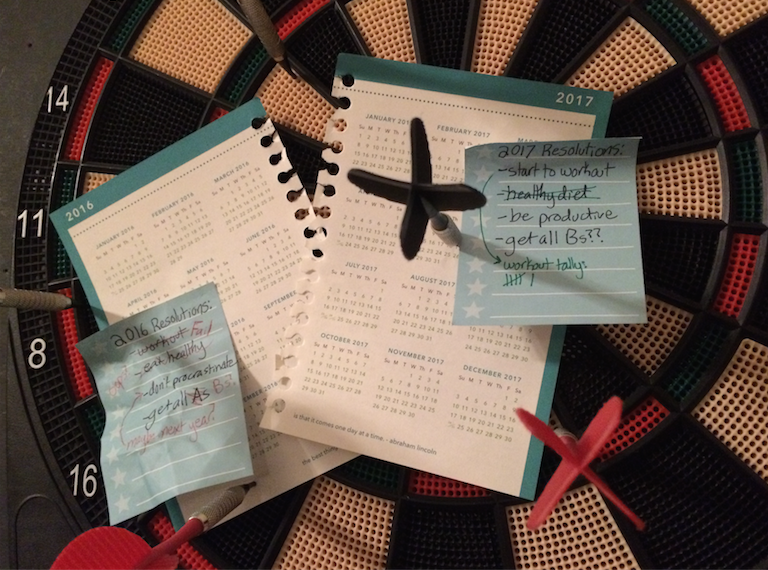New year, same you: why setting resolutions is a waste of time
With a new year filled with new opportunities, many people take the initiative to plan out resolutions for the upcoming year. Unfortunately, according to Business Insider, around 80 percent of people do not uphold their resolutions resolutions and fail by February and continue to pledging the same change year after year. Photo by Hannah Tucker.
January 13, 2017
My dad and I regularly work out together three times a week.
On the first Saturday of the new year, we drove to our local gym and traveled through a parking lot hosting almost double the amount of cars it had seen just the week before. While waiting in a healthy-sized line at check-in, I cast quick glance around the gym and, as expected, it was packed – definitely not the norm.
Here we go.
The arrival of 2017 ushers in the all-too-familiar sentiments of dawning change and opportunities to a fresh start. As with any new year, parties are thrown, balls are dropped and notorious resolutions are made. Whether it is to shed 20 pounds, strive for better grades or finally get around to learning that second language, January is undoubtedly the month of ambition.
However, what does it say about the nature of this ambition when, by the three week mark of 2017, my family’s gym has more or less deflated back to the same activity as before? According to Business Insider, 80 percent of New Year’s resolutions flop by February.
Setting goals for the new year is an admirable endeavor and one that appears productive at a distance but, in reality, its very nature ensures failure.
“Many of us can be overzealous in our goal setting, setting the bar too high,” CHS lead counselor Debbie Fruithandler said. “One really needs to think about what they would need to change in their routine.”
Setting the bar too high is only part of the problem. When all the effort one has made towards a goal is proclaiming it to friends and family abruptly on Jan. 1, success is not the most likely outcome. These days, New Year’s resolutions have become a tradition – and with tradition often comes complacency. We are dully reciting goals we barely believe in ourselves, all for the sake of simply having one to show off.
Accomplishment takes hard work, discipline, perseverance and passion, all stretched out across a significant expanse of time and also requires a trained mindset – one that cannot be so easily acquired at the drop of a hat (or ball). It is no wonder we gravitate towards unrealistic goals when our own concepts of accomplishment are so skewed.
The existence of New Year’s resolutions has inadvertently placed a time tag on when we should make plans to better ourselves. It is easy to look at a poor set of grades in November and think, “I’ll make my New Year’s resolution about getting all A’s!”
Now, instead of immediately attacking the problem, an excuse is to casually permit two more months of poor behavior on the weak idea of improvement at a later date. It is significant to note that these sorts of broad, unstructured proclamations serve no use in directing us to achievement either – no study plan is made, no schedule brainstormed.
This is why I do not have any New Year’s resolutions for 2017 and why I encourage you to stop making them as well.
We should be constantly making goals, regardless of what month it is. Making a continuous effort to succeed in any area of focus is the ultimate key to achievement and our desire to improve ourselves should never be limited to only one month of 12.











